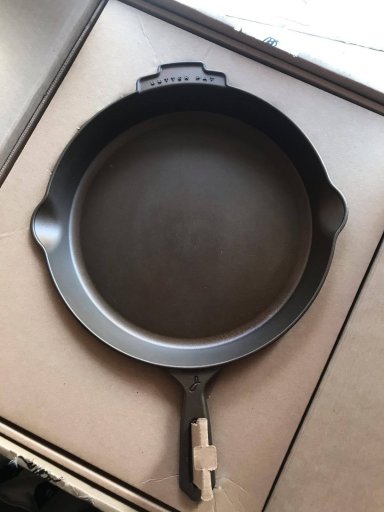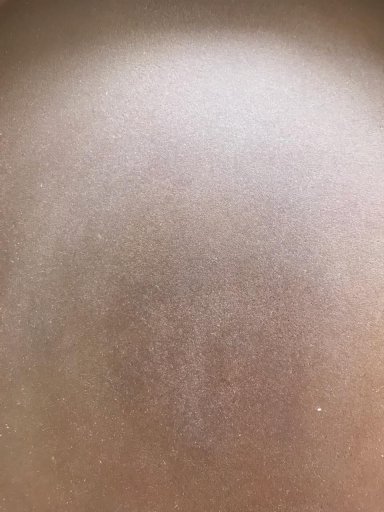I have a beer can of clean bacon grease in my fridge at all times.Ha ha. My mother used to save the bacon grease in an old coffee can, and alternate with crisco
Let's Talk Cast Iron
- Thread starter DBAR
- Start date
I will often use vegetable oil, or bacon grease (like Shokgoblr) to season a pan from the beginning.I admit I have not had crisco in my house since I moved out back in 1990-91. I MAY rethink that, just for the pans. I have been using canola oil and baking the pans for an hour, cool, bake again.
I do have a pan that is my all time favorite though - but I just can't seem to get it to season properly no matter what oil/grease used!! It'll work fine for the first, and maybe second use, but after that it's almost as if the pan was never seasoned.
ptgarcia
Rank III

Enthusiast III
I do what my grandmother taught me. Bacon grease in the oven at 400 (pan upside down so excess drips out). Do that a few times, then move on to cooking bacon and then on to other things. I do not use vegetable, avocado, grapeseed or any of the oils they never had back in the old days. The more stuff you can BAKE in the new pan, the better.
This works. It builds over time. Eggs will stick for a few weeks.
Or use modern oils and the eggs won't stick at all. Sure, the old ways worked, but they took time. My way takes a day.

Traveler II
This has been quoted by many as "the" method. Gonna give it a go this weekend as I just can't get my 12 inch to form a strong bond.

Contributor II
My preferred options are my Dutch Oven by Lodge, My Cast Iron Jim Beam Wok, and for eggs my 3.5 inch lodge mini cast iron skillet. I like to wipe down my cast iron with a paper towel that I pour a little oil on.I absolutely love cooking with cast iron but I don't normally take it with me camping. I think I am partially afraid of the care and upkeep. Even though I know that a well-seasoned piece of cast iron is just as good if not better than a non-stick pan. Something about having my precious cast iron out and exposed to the elements freaks me out. Really I wanted to ask:
Who here uses cast iron while camping or on the trail? How is maintenance? Would you recommend using cast iron over a steel or other type of pan?
I also know that there are a tone of interesting pieces of cast iron cookware so what is your favorite to use? Mine is the dutch oven!
As I understand it, cast iron of the past was made with mich more smoothed surfaces than the Lodge version, which is a bit more rough.In addition to cooking in my dutch oven during my last camping trip I took advantage of the campfire and tossed in an old cast iron skillet that was coated with nasty years of grease and neglect. In fact this pan had sat outside by my junk pile for a year as I never intended to clean it up or cook with it. Even though many advocate against doing so, that campfire cleaned the snot out of that pan and took it down to bare metal. Once home I gave it a wire wheel brush treatment to knock off any residual dirt and rust that had formed, then ran it through a couple cycles of a 425 oven and uber light coats of cooking oil. Immediately that old pan (I think it is approximately 100 years old) has become a phenomenal non-stick skillet, far surpassing all my Lodge stuff that I have labored for years to get properly seasoned. Maybe it’s just the difference between old cast iron and new, but something sure is magically different with this pan. I’m going to try and find another old pan and give it the same treatment and see how it comes out.
With at least one of my Lodge pans, I sanded the cooking surface smoothe before the oil and bake sessions, and as a result, it is indeed my most non-stick Lodge pan I have.
What process did you use when you sanded yours?As I understand it, cast iron of the past was made with mich more smoothed surfaces than the Lodge version, which is a bit more rough.
With at least one of my Lodge pans, I sanded the cooking surface smoothe before the oil and bake sessions, and as a result, it is indeed my most non-stick Lodge pan I have.
Last edited:
When I bake mine, after oiling with a paper towel or lint-free cloth, I bake in the oven at 350 or 400 for an hour, then let cool, and repeat. But I alternate baking right side up, then upside down. Dont know if that's proper or not. A slightly thicker layer of oil on the cooking surface, and it goes right side up, to try and make a skating rink of baked oil surface.When I do mine, I set the skillet/griddle/etc. on the stove top burners and heat to about 200*, then wipe on a thin layer of oil (avocado, usually) then bake an hour at 425*. I then let it cool completely in the oven. Then before I store the cast iron I give it a wipe with an oily cloth.
Last edited:

Steward I
There are a few schools of thought in cast iron. Lodge sells rough-finished skillets - while some people grind them to a mirror, others try to build up a thick layer of seasoning / gunk to build it up. More traditional skillets were polished smooth - Smithey sells them that way from day one - so a very thin layer of seasoning can gradually develop over time.
ptgarcia
Rank III

Enthusiast III
As I understand it, cast iron of the past was made with mich more smoothed surfaces than the Lodge version, which is a bit more rough.
With at least one of my Lodge pans, I sanded the cooking surface smoothe before the oil and bake sessions, and as a result, it is indeed my most non-stick Lodge pan I have.
I have (3) Lodge cast iron items, and I sanded the skillet and griddle and left the grill pan unsanded. I used a 2" 80-grit sanding disk on my little Milwaukee M12 polisher/sander. I spent 15 minutes or so and a couple/few disks on each and took the cooking surface down to bare metal. I haven't cooked with these particular pans since sanding and re-seasoning, but they sure are smooth to the touch.
+1 for the bacon grease, adds great flavor and color and seems to works as good with canola oil.
We have a pot/pan (8 inches I think) set from Bare Bones Living, I think they're made in china but they look great and have held up fine over 3 years. They belt together with a wooden trivet and we stick them in our drawer and it fits nicely. Last year we added a large carbon steel skillet from Lodge which has been great.
For cleaning: to me, easiest thing is right after you're done cooking take out any leftovers slash waste keep/get to cooking temps and splash just a bit of water on the hot pan and scrape with a wooden spatula/spoon, everything will right up and you just chuck it. Let it stay hot, wipe with single paper towel, dry, and its pretty much good to for next. Can always oil it and heat it after that to thicken the seasoning layer but not always necessary.
We have a pot/pan (8 inches I think) set from Bare Bones Living, I think they're made in china but they look great and have held up fine over 3 years. They belt together with a wooden trivet and we stick them in our drawer and it fits nicely. Last year we added a large carbon steel skillet from Lodge which has been great.
For cleaning: to me, easiest thing is right after you're done cooking take out any leftovers slash waste keep/get to cooking temps and splash just a bit of water on the hot pan and scrape with a wooden spatula/spoon, everything will right up and you just chuck it. Let it stay hot, wipe with single paper towel, dry, and its pretty much good to for next. Can always oil it and heat it after that to thicken the seasoning layer but not always necessary.
I use the canola oil. Cleaning follows closely to your method, only after waste is out, I scrub it with coarse sea salt and rinse. I dry with a hand towel, and then coat with canola oil. Depending on how many times I've done that, I give it an hour baking.+1 for the bacon grease, adds great flavor and color and seems to works as good with canola oil.
We have a pot/pan (8 inches I think) set from Bare Bones Living, I think they're made in china but they look great and have held up fine over 3 years. They belt together with a wooden trivet and we stick them in our drawer and it fits nicely. Last year we added a large carbon steel skillet from Lodge which has been great.
For cleaning: to me, easiest thing is right after you're done cooking take out any leftovers slash waste keep/get to cooking temps and splash just a bit of water on the hot pan and scrape with a wooden spatula/spoon, everything will right up and you just chuck it. Let it stay hot, wipe with single paper towel, dry, and its pretty much good to for next. Can always oil it and heat it after that to thicken the seasoning layer but not always necessary.
ah! I keep meaning to try the coarse sea salt part and always forget. I should add I use a copper "steel wool" ball to scrub, softer than steel wool and doesnt scratch through coating but it does a similair exfoliation to sea salt scrubbing i imagine. Theyre cheap at the grocery store too, and they dont get stinky dirty very fast.I use the canola oil. Cleaning follows closely to your method, only after waste is out, I scrub it with coarse sea salt and rinse. I dry with a hand towel, and then coat with canola oil. Depending on how many times I've done that, I give it an hour baking.

Member II
- 889
- First Name
- Pete
- Last Name
- Meuser
- Member #
-
20275
- Ham/GMRS Callsign
- GMRS WREL270
Bake your bacon at 375 on parchment paper and the drippings will be crystal clear when you pour them off.I have a beer can of clean bacon grease in my fridge at all times.

Member II
- 889
- First Name
- Pete
- Last Name
- Meuser
- Member #
-
20275
- Ham/GMRS Callsign
- GMRS WREL270
If you need abrasive use salt.+1 for the bacon grease, adds great flavor and color and seems to works as good with canola oil.
We have a pot/pan (8 inches I think) set from Bare Bones Living, I think they're made in china but they look great and have held up fine over 3 years. They belt together with a wooden trivet and we stick them in our drawer and it fits nicely. Last year we added a large carbon steel skillet from Lodge which has been great.
For cleaning: to me, easiest thing is right after you're done cooking take out any leftovers slash waste keep/get to cooking temps and splash just a bit of water on the hot pan and scrape with a wooden spatula/spoon, everything will right up and you just chuck it. Let it stay hot, wipe with single paper towel, dry, and its pretty much good to for next. Can always oil it and heat it after that to thicken the seasoning layer but not always necessary.
I get good results baking it on a rack over a pan.Bake your bacon at 375 on parchment paper and the drippings will be crystal clear when you pour them off.

Enthusiast III
Personally I only use Cast, Stainless or Glass to cook anymore - Home or camping. Aluminum is popular because its light weight - But its also toxic. With Aluminum cookware, it will absorb into the food a bit at a time, just like Iron does with Cast iron cooking. While you will find mainstream site saying it wont hurt you - Its a cumulative effect, just like Lead or Mercury.Would you recommend using cast iron over a steel or other type of pan?
Aluminium neurotoxicity: neurobehavioural and oxidative aspects

Aluminium neurotoxicity: neurobehavioural and oxidative aspects - PubMed
Aluminium is the most widely distributed metal in the environment and is extensively used in daily life that provides easy exposure to human beings. The exposure to this toxic metal occurs through air, food and water. However, there is no known physiological role for aluminium within the body...
ATSDR - Page Not Found or Temporarily Unavailable | ATSDR
Why take the chance. Just my .02
Agreed! Having been in the recycling industry for 14 years and around aluminum processing mills that shred aluminum scrap and those that shred steel scrap, Aluminum Neurotoxicity is a real concern. I made the move to another side of my industry and now out of the recycling end and into the front side of the industry in raw material sales.Personally I only use Cast, Stainless or Glass to cook anymore - Home or camping. Aluminum is popular because its light weight - But its also toxic. With Aluminum cookware, it will absorb into the food a bit at a time, just like Iron does with Cast iron cooking. While you will find mainstream site saying it wont hurt you - Its a cumulative effect, just like Lead or Mercury.
Aluminium neurotoxicity: neurobehavioural and oxidative aspects

Aluminium neurotoxicity: neurobehavioural and oxidative aspects - PubMed
Aluminium is the most widely distributed metal in the environment and is extensively used in daily life that provides easy exposure to human beings. The exposure to this toxic metal occurs through air, food and water. However, there is no known physiological role for aluminium within the body...pubmed.ncbi.nlm.nih.gov
"Eating large amounts of processed food containing aluminum additives or frequently cooking acidic foods in aluminum pots may expose a person to higher levels of aluminum than a person who generally consumes unprocessed foods and uses pots made of other materials (e.g., stainless steel or glass). However, aluminum levels found in processed foods and foods cooked in aluminum pots are generally considered to be safe."ATSDR - Page Not Found or Temporarily Unavailable | ATSDR
www.atsdr.cdc.gov
Why take the chance. Just my .02
I'd suggest looking into titanium for alternative lightweight cooking. It's tough and lasts a long time. Sure it's expensive, but buy once cry once.
That being said....you can't beat an old cast iron pan for campsite cooking!!
Always cast iron for me. Home or at camp. I don't own or cook with anything else except stainless steel pots. I started years ago with Lodge, but now I am loving my new Field Company skillet and it's great. I have an 8in that sees most of the cooking, and a 12in for times when more room is needed or MORE CORNBREAD!







